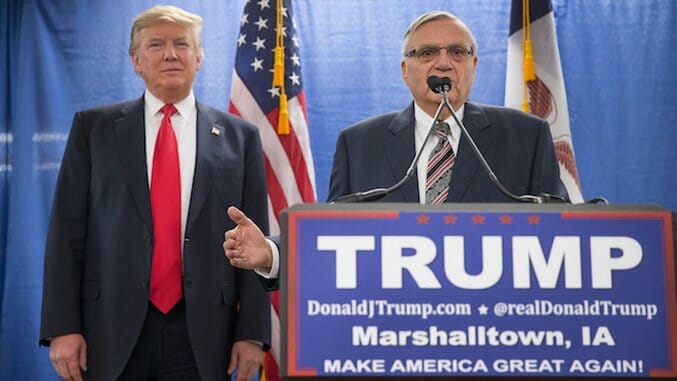Trump, Like Presidents Before Him, Tells the Real Criminals “You Can Get Away With It.”
Photo courtesy of Getty
President Trump and Sheriff Joe Arpaio share a common view about crime: They are completely indifferent to prosecuting criminals who pose a threat to society. They simply don’t care about serious crimes or the criminals who commit them. Despite their gratuitous rhetoric about “law and order,” they don’t see a use for law or order (unless it suits their personal or political ambitions), and it would be far more fair to say that they are “soft on—[serious or violent]—crime.”
One of the more disturbing facts that has once again come to light in the wake of Arpaio’s presidential pardon is his systematic disregard for going after dangerous criminals, or rather, doing his job. A Pulitzer Prize-winning investigation by the East Valley Tribune titled “Emergency response, enforcement of other crime suffers with focus on illegal immigration” reveals this trend in great detail. Authors Giblin and Gabrielson write, “In El Mirage, for instance, sheriff’s detectives did little or no investigation on at least 30 violent crime cases, including a dozen reported sexual assaults, during 2006 and 2007.”
The list goes on. Arpaio’s Maricopa County Sheriff’s Office (MCSO) was infamous for not diverting resources (from federal immigration enforcement) to investigate armed robbers, child molesters, sexual predators, and human traffickers, all while the arrest rate “plunged” and the amount of criminal investigations “soared.” Furthermore, “a Tribune review of thousands of pages of the sheriff’s immigration arrest records from 2006 and 2007 show deputies found the illegal immigrants arrested by MCSO rarely committed other crimes.” And, as Nathan Robinson aptly noted in Current Affairs, Arpaio said himself that he would “go after illegals, not the crime, first.”
But if we’ve learned anything from Arpaio’s unsurprising, but still sickening, pardon, it’s that intentionally neglectful police work, brutal violence and torture of prisoners, obscene publicity stunts designed to distract from criticism, and all the like, do not a criminal make. It merely—and glibly, I might add—makes him “controversial,” according to CNN.
Of course, Arpaio became a criminal when a federal judge found him guilty of defying a court order to stop detaining immigrants based solely on suspicion of their undocumented status. He was likely to do time if Trump hadn’t intervened. But if Arpaio hadn’t been convicted of a crime in the first place, he likely wouldn’t have needed a pardon to get away with abusing his power and committing heinous acts of violence against people based on the color of their skin.
And this is a reality of American politics we must confront. Very few high level criminals have to face consequences for their actions. George W. Bush and his cabal of war criminals and torture enthusiasts started a war on based on false pretenses—lies—and never had to face the music. Likewise, the Wall Street titans who crashed the global economy, after breaking several laws, were more likely to get cabinet positions than a jail sentence. But of course if you are convicted—in the court of law, or impeached, like Nixon—you can be exonerated with a presidential pardon.
And this is what happened. Arpaio sent a message to violent and dangerous criminals saying they wouldn’t be investigated (effectively inverting the law to suit his agenda), and Trump, like the presidents who went before him, sent a message to Arpaio: “You can get away with it.”
If either of these men were concerned with law or order they would go after criminals—starting with themselves.
Will Meyer is writer and musician. You can listen to his band or argue with him on Twitter.






































